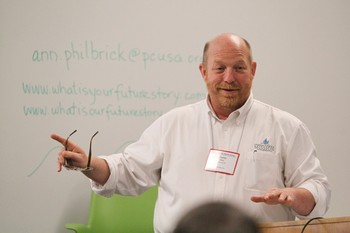Ever since the publication of the results of a 2011 Presbyterian Panel survey, many questions have been circulating across the Presbyterian Church (U.S.A.) concerning the response to the statement, “Only followers of Jesus Christ can be saved” [see page A-10].
The Presbyterian Panel is a representative sample of nearly 2,000 Presbyterians— members, ruling elders, pastors, and specialized ministers—who serve on the Presbyterian Panel for a three-year period and respond to mailed questionnaires four times a year. The Panel provides a way to listen to and collect information about the general practices, beliefs, and opinions of Presbyterians.
Because the Rev. Dr. Charles Wiley III, coordinator of the Presbyterian Mission Agency’s office of Theology and Worship, says the survey’s findings on this issue are still a “live” issue for congregations that may be considering leaving the PC(USA), he has written the following statement.
-----
On the Presbyterian Panel Survey Question on Jesus Christ
Charles Wiley, Office of Theology and Worship
January 2016
One of the questions I deal with regularly in my job is the problem that came from a 2011 Presbyterian Panel survey that asked about the necessity in belief in Jesus Christ for salvation. Many Presbyterians have been shocked by the fact that among Presbyterian ministers surveyed, only 41% strongly agreed or agreed with a statement on salvation through Christ alone. This has disappointed many Presbyterians as an indication of a weak Christology, a weak affirmation of salvation in Christ.
This may be true of some who answered neutrally or the negative to this question, but the criticism of the response also betrays a lack of Reformed theological understanding among Presbyterians broadly. The problem is in the very form of the question. Those surveyed were asked whether or not, “Only followers of Jesus Christ can be saved.” The subject of the question is “followers.” Calvinists have never been comfortable talking about salvation from the point of view of the followers—we’ve never been terribly optimistic concerning human ability to follow Christ. Calvin spoke about needing to have faith that he was saved, and then only because of the author of salvation, Jesus Christ. We Calvinists emphasize salvation as a work of Christ—our following is an act of gratitude for salvation.
This emphasis on salvation as a work of Christ is evidenced in “Hope in the Lord Jesus Christ,” endorsed by the General Assembly in 2002:
Jesus Christ is the only Savior and Lord, and all people everywhere are called to place their faith, hope, and love in him. . . . No one is saved apart from God’s gracious redemption in Jesus Christ. Yet we do not presume to limit the sovereign freedom of “God our Savior, who desires everyone to be saved and to come to the knowledge of the truth” [1 Timothy 2:4]. Thus, we neither restrict the grace of God to those who profess explicit faith in Christ nor assume that all people are saved regardless of faith. Grace, love, and communion belong to God, and are not ours to determine.
What you see in this quotation is a Christocentric, traditionally Calvinist reason to answer no to the question in the Presbyterian Panel survey. This no comes not from a weak Christology, but precisely from a strong Christology. It is a strong Christology that resists reinterpreting the faith in light of American Voluntarism that determines our salvation on the basis of our visible following rather than the work of Christ.
The proper form of the question should have been, “Is Jesus Christ the only Savior and Lord?” To that the clear answer is yes. To the statement on the survey, “Only followers of Jesus Christ can be saved,” the orthodox answer is no.
Wiley가 예수 그리스도에 대한 장로교 패널 (Presbyterian Panel) 설문조사의 질문을 명확하게 설명하다
Lea ‘Esperanza en el Señor Jesucristo’ en español.

